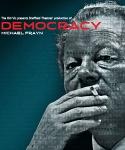Democracy
Michael Frayn's play 'Democracy' premiered at the National in 2003 and won the Evening Standard's award for best play in the same year. A handsome pedigree and one which easily justifies a revival, first produced in March this year at the Crucible Theatre, Sheffield and now at the Old Vic. It is 1969 and the middle of the Cold War (which lasted from 1947 to 1991). Willy Brandt becomes Chancellor of West Germany. The people of that country have dragged themselves out of the ruins of World War II and the country is booming - thanks to the 'economic miracle'. But West Germany still finds it is not on the best of terms with its neighbours. Brandt's vision is reconciliation with the Soviet Union, Poland and communist East Germany.
At the beginning of the play, Brandt is setting-up his new office. By co-incidence and a good deal of luck, the East German Ministry of State Security, better known as the Stasi, have planted a spy, Günter Guillaume (played by Aidan McArdle), who is given a job working in the same building as Brandt. In time Guillaume uses his administrative efficiency and charming demeanour to worm his way up the ladder to become Brandt's trusted aide. Even when Brandt is warned that his personal assistant may be a spy, he takes Guillaume's family on holiday with him to Norway. But in the end, Brandt pays the ultimate price for trusting Guillaume, though it was not to wreck his political career entirely - he continued as Chairman of the Socialist Democratic Party until 1987 and for a time was also a member of the European Parliament.
Patrick Drury's Brandt is a charismatic, almost regal figure who is 'loved' by the West German people and, supposedly, by his political allies. However, the Brandt we get to know is certainly no untainted messiah. He has a fondness for the opposite sex which borders on obsession. And he later suffers from depression and self-doubt. Aidan McArdle's Guillaume is almost Brandt's opposite. Chirpy, humorous, cunning and obviously brave, Guillaume is described in the play as looking more like ".. the manager of a pornographic bookshop", which might be just the perfect cover for a spy working in the heart of government. The contrast between the two leading characters works exceptionally well, and there's good support from the entire cast, especially William Hoyland as Herbert Wehner, the party 'fixer' who is not afraid to get his hands dirty by sticking them down the political toilet.
On a stage which is precipitously raked and thrusts out well past the proscenium arch and into the front stalls, a couple of desks and chairs, a conference table, and numerous boxes of files are strategically placed about the stage to form offices and meeting rooms. However, everything else in Simon Daw's design is jet black. And the compulsory smoke drifts over the gloomy setting before the show begins, suggesting conspiracy, foreboding and dark deeds done by men in grey suits at the dead of night.
I am not so certain that 'Democracy' really has very much to do with democracy, though it certainly is an integral part of the play and was one of the lynchpins in Brandt's political vision. The term is discussed several times, and it is also true that the play involves elections and an inside view of the political machinery of government and power. But all that aside, the title is a little misleading, because the real focus is the Guillaume affair. Michael Frayn obviously recognised a great story and turned it into a polished drama which is intriguing, well-structured, compelling, and at times quite funny. As a rough comparison in style, think John Le Carré's 'Tinker, tailor, Soldier, Spy' and you won't go far wrong, even though the uncovering of this mole is not as important as the relationship he develops with the Chancellor.
Apparently it was not the intention of the Stasi to topple Brandt from power. In fact, the planting of the mole inside Brandt's office was later seen by some of the Stasis' functionaries as one of their biggest mistakes. Willy Brandt won the Nobel Peace prize in 1971 for his efforts to reconcile West Germany and the Soviet bloc countries. And in 2003, in a strange twist to the Guillaume affair, Willy Brandt's son, Matthias Brandt, played the part of Guillaume in a film entitled 'In The Shadow of Power'. Additionally, it was Matthias who reported Guillaume and his wife typing 'mysterious things' on typewriters in the middle of the night while they were on holiday in Norway with the Brandt family. Even with all his imaginative powers and creative skills, I don't think that Michael Frayn could have thought-up that ending!
(Peter Brown)
"An uncompromisingly heavyweight piece...Democracy often resembles a dry history lesson."
Henry Hitchings for The Evening Standard
"Paul Miller's direction makes as much as Frayn's text will allow of the human relationship between Brandt and Guillaume, and the parallel relationship between Guillaume and his Stasi handler, Arno (Ed Hughes). But this is a play in which — as in real life — human emotions are subordinate to the crushing imperative of the political process."
Jane Shilling for The Daily Telegraph
External links to full reviews from popular press
Daily Telegraph -
Originally published on
